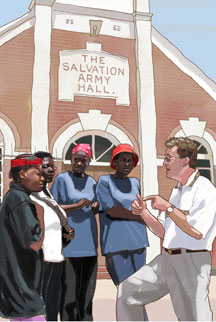
AFRICA CLOSEUP / MASIYE
CAMP EXPLAINED
| Introducing Faith |
| Masiye Camp Explained |
| The Splashgirls |
| The Swiss Connection |
| Faith talks about AIDS |
| Faith and Volunteering |
| Ezekiel Mafusire, Masiye Camp Director |
| Faith and School |
| Faith Visits Her Rural Home |
| Faith at Home |
| About |
| Contact |
Copyright
2005 Zina Saunders All rights reserved |
Stefan Germann is the founder of the Masiye Camp. When he finished his undergraduate courses in micro-engineering in 1991, "I met a Swiss medical doctor who was going back to Zimbabwe to lead a clinic-hospital upgrading program there," he says. "He asked me to help as project manager. My micro-engineering studies included medical technology and project management, and that's how I got involved."
By 1991, AIDS was becoming a real problem for hospitals, "We started prevention programs and home-based care programs (HBC) in 1992. The HBC program led to starting a community-based orphans care program in 1993. I was doing the project design and fundraising for all the HIV/AIDS and orphan programs."
It began to be very clear that, while the physical needs of the children were were the focus of his and other orphan aid programs around Zimbabwe, the children's psychological needs were being entirely overlooked. Masiye Camp was founded in 1998 to fill this vacuum.
"Thenjiwe, Jabulani and I started the Masiye Camp. Thenjiwe is my wife. She was working in the hospital I was. She was a youth worker, and after a couple of years got her degree in psychology. Jabulani is a guy I worked with at that hospital, too, in getting orphan care programs going."
The name, "Masiye" is derived from 2 languages: in Ndebele, the word, "masiyiephabile", means "Let's go forward," and in the Malawian language, "Masiye" means "orphan". The Camp occupies an area of about 3 square miles (750 hectares) and offers an adventure-based and wilderness type of camping, based on the Outward Bound concept. Its major objective is to allow the participant to discover their full potential by direct experiences and challenges. This method of giving life skills through bush camps is an old African tradition still practiced in some societies today and has been revitalized to address this new stress on the community caused by HIV and AIDS. [from Masiye.com]
AIDS isn't as much a shameful secret anymore, "I think there's been a lot of change, because everybody has been affected." He has personal experience with AIDS, "In my own family, we are very open about it, my sister-in-law, she's HIV positive and her husband. And we, sort of, the whole family knows about it, and we talk about it, and it's been normalized, more and more. Most families have lost more than one member in the extended family. It's becoming sort of accepted."
Stefan Germann is no longer involved with the day-to-day working of the Masiye Camp. "I was asked to take up the job as head of the World Victim Tsunami technical response team, so we moved to Singapore earlier this year,' he says.
Germann believes that "Operation Murambatsvina" (Operation Drive Out Trash), President Mugabe's campaign to destroy the shantytowns in the cities of Zimbabwe, has made the situation even more dire, "I think 25% of the population would have been the plateau, before. But I think with what has happened recently, I think it might rise to, probably, 27, or 30%."
Asked why the current situation would cause an increase in HIV infection, he says, "If you are concerned mainly with how you can live up till the end of the week, you are not that concerned with how your life will look in 5 years. In terms of bothering to find a condom, if you can't even buy a piece of bread, and your choice is between buying a piece of bread and buying a condom... I mean, your choice is clear."
